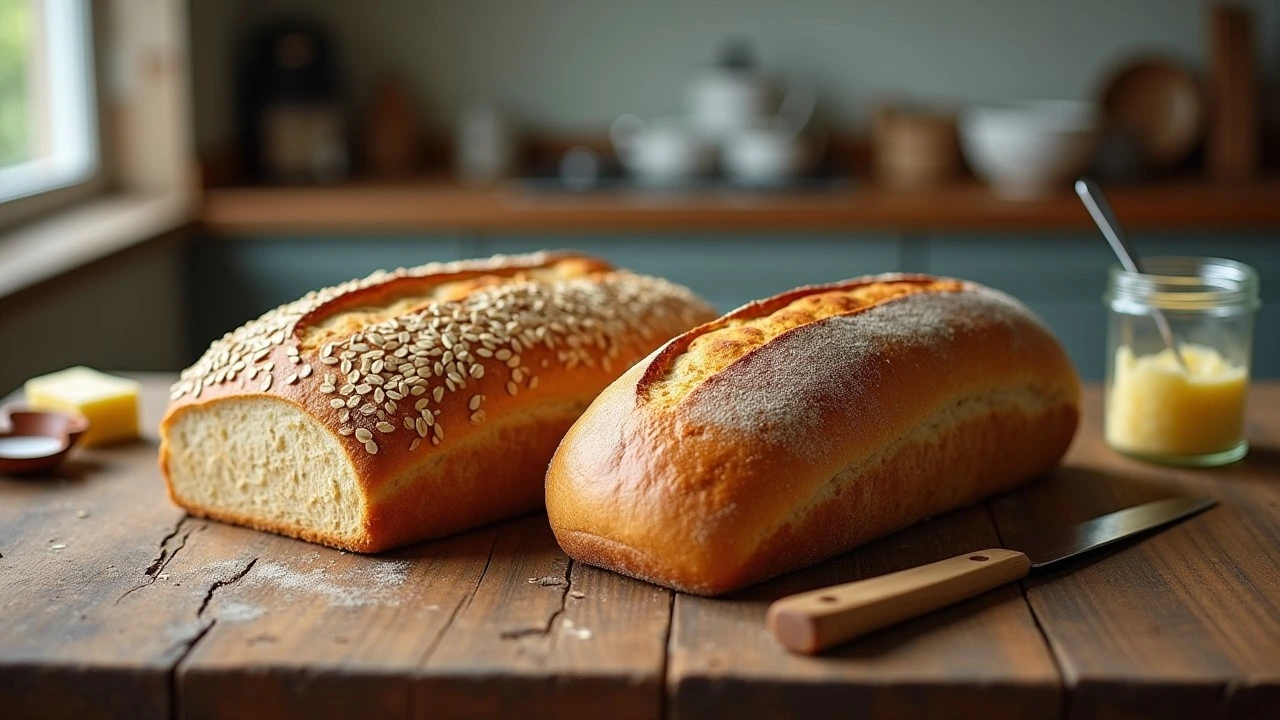Hey there, bread lovers! Let’s be real—bread is life. Whether it’s for sandwiches, toast, or just that perfect side for your soup, it’s hard to beat the comforting carb goodness of a warm slice. But when you’re staring at the bread aisle, you might wonder: Is oat bread better for you than wheat bread? Well, buckle up, because we’re about to get into it—and trust me, it’s worth knowing.
Why We’re Talking About This (Hint: Bread Wars Are Real)
If you’ve ever debated with your partner (or yourself) over which bread to buy, you’re not alone. Wheat bread is the OG—it’s what most of us grew up eating. But oat bread? It’s got this whole “healthier choice” vibe going on. So, what’s the deal? Spoiler: It’s not as simple as “one’s better than the other.” Both have their perks, and it depends on what you’re looking for.
What’s the Difference Between Oat Bread and Wheat Bread?
First off, let’s talk basics. Wheat bread is, well, made from wheat. Depending on whether it’s whole wheat or refined, it can either be super nutritious or kind of just…there for the carbs. Oat bread? That’s made with oats (duh), but it usually has wheat flour mixed in unless it’s specifically gluten-free.
- Wheat bread: Classic, affordable, and comes in whole-grain or refined options.
- Oat bread: Heart-healthy, often packed with fiber, and slightly sweeter.
Taste-wise, wheat bread is earthy and neutral, while oat bread has this soft, slightly nutty flavor that feels fancy (but isn’t).
Nutrition Showdown: Is Oat Bread Healthier Than Wheat Bread?
Alright, if you’re grabbing bread for more than just a PB&J fix, you’re probably curious about the health stuff. Here’s the lowdown:
Calories and Carbs
Both oat and wheat bread are pretty similar here. They’ve got carbs (duh—they’re bread), but oat bread might have a tad more fiber, which helps slow down how your body processes the carbs. Translation? No sugar crash.
Fiber
Oat bread wins the fiber battle. Oats are loaded with soluble fiber, which helps keep cholesterol in check. Wheat bread has fiber too, especially the whole-grain kind, but it’s more the “keep your digestion moving” type.
Vitamins and Minerals
Oat bread is like the overachiever in class—magnesium, iron, zinc, and even a bit of calcium. Wheat bread is solid too, especially with B vitamins like thiamine and niacin. But let’s be honest, the more processed versions aren’t bringing much to the table.
Health Benefits of Oat Bread vs. Wheat Bread
Here’s where things get fun. Both oat bread and wheat bread have their moments to shine.
Oat Bread’s Superpowers
- Heart Health: Oats are famous for helping lower LDL cholesterol (you know, the bad kind).
- Blood Sugar Control: That fiber we mentioned? It keeps your blood sugar from spiking.
- Gluten-Free Options: If gluten’s your nemesis, there are oat breads made just for you.
Wheat Bread’s Strengths
- Energy Booster: Need quick fuel? Wheat bread’s carbs have your back.
- Gut Health: Whole wheat is packed with insoluble fiber, keeping things…um, regular.
- Budget-Friendly: Let’s face it, wheat bread is usually cheaper and easier to find.
So…Which One Should You Pick?
Here’s the thing: There’s no “one-size-fits-all” answer. If you’re watching your heart health or need more fiber, oat bread is a rockstar. If you’re more about budget-friendly options and don’t mind gluten, wheat bread (especially whole wheat) is a great choice.
A Few Tips for Bread Lovers
- Read the Label: Not all breads are created equal. Look for “whole grains” as the first ingredient.
- Watch the Sugar: Some oat breads sneak in extra sugar—don’t fall for it!
- Go Fresh: If you’ve got a local bakery, hit them up. Fresh bread tastes better, period.
FAQs About Oat Bread and Wheat Bread
1. Are Eggs Good for Gut Health?
Yes, eggs support gut health. They are rich in protein, vitamins, and choline, which nourishes gut cells.
2. What is the Best Breakfast for Weight Loss?
A balanced breakfast with protein, fiber, and healthy fats, like oatmeal with berries or eggs with avocado on whole-grain toast.
3. What is the Healthiest Bread You Can Eat?
Whole grain, sprouted grain, or sourdough bread are the healthiest options. Gluten-free alternatives like almond flour bread work too.
4. What is the Number One Carb to Avoid?
Refined carbs like white bread, pastries, and sugary drinks. Choose whole grains and vegetables instead.
The Bottom Line: It’s All About Balance
At the end of the day, bread isn’t the enemy (can we just retire that myth already?). Whether you go for oat bread or wheat bread, what matters is finding one that fits your lifestyle and tastes good to you. And hey, life’s too short for boring bread—so grab what makes you happy and slather it with something delicious.

